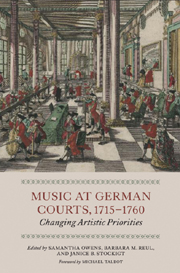Book contents
- Frontmatter
- Contents
- List of Tables
- Foreword
- Preface
- Editorial Notes
- Notes on Contributors
- List of Abbreviations
- 1 ‘Das gantze Corpus derer musicirenden Personen’: An Introduction to German Hofkapellen
- KINGDOMS AND ELECTORATES
- DUCHIES
- PRINCIPALITIES AND PRINCE-BISHOPRICS
- 9 The Court of Anhalt-Zerbst
- 10 The Court of Sondershausen
- 11 The Court of Würzburg
- LANDGRAVIATES AND MARGRAVIATES
- Index
11 - The Court of Würzburg
from PRINCIPALITIES AND PRINCE-BISHOPRICS
Published online by Cambridge University Press: 12 September 2012
- Frontmatter
- Contents
- List of Tables
- Foreword
- Preface
- Editorial Notes
- Notes on Contributors
- List of Abbreviations
- 1 ‘Das gantze Corpus derer musicirenden Personen’: An Introduction to German Hofkapellen
- KINGDOMS AND ELECTORATES
- DUCHIES
- PRINCIPALITIES AND PRINCE-BISHOPRICS
- 9 The Court of Anhalt-Zerbst
- 10 The Court of Sondershausen
- 11 The Court of Würzburg
- LANDGRAVIATES AND MARGRAVIATES
- Index
Summary
A PRINCIPAL DIFFERENCE between ecclesiastical governments and secular ones is the lack of dynastic succession. The consequences arising from this circumstance are illustrated, pars pro toto, by the Würzburg Hofmusik, an institution that continued to exist into the nineteenth century. The continual succession of rulers from different backgrounds prevented the ongoing pursuit of any specific long-term goals over the course of several reigns. This tendency was strengthened by the cathedral chapter, which, as the governing body, tended to let itself be guided by experiences gathered under the immediate predecessor when selecting a new ruler. Consequently, the prince-bishops who succeeded one another might hold entirely different, even contradictory interests, and this could affect the musical institutions of the court.
THE SOURCES
During the bombing of Würzburg on 16 March 1945, great quantities of valuable primary sources were irretrievably lost, including the entire surviving musical repertory of the Hofkapelle, of which not even an inventory has been preserved. Important files from the State Archives, such as salary registers of the court servants, also went up in flames. Subsequently, given the decimation of the holdings, research in this area was hardly considered an encouraging prospect. On closer inspection, however, it became apparent that the pre-war researchers who were able to draw from the complete collection did not come close to uncovering all the sources: on the one hand, they appear to have overlooked a fair amount, while on the other, a meticulous examination of the sources undoubtedly required a great deal of time.
- Type
- Chapter
- Information
- Music at German Courts, 1715–1760Changing Artistic Priorities, pp. 305 - 330Publisher: Boydell & BrewerPrint publication year: 2011

